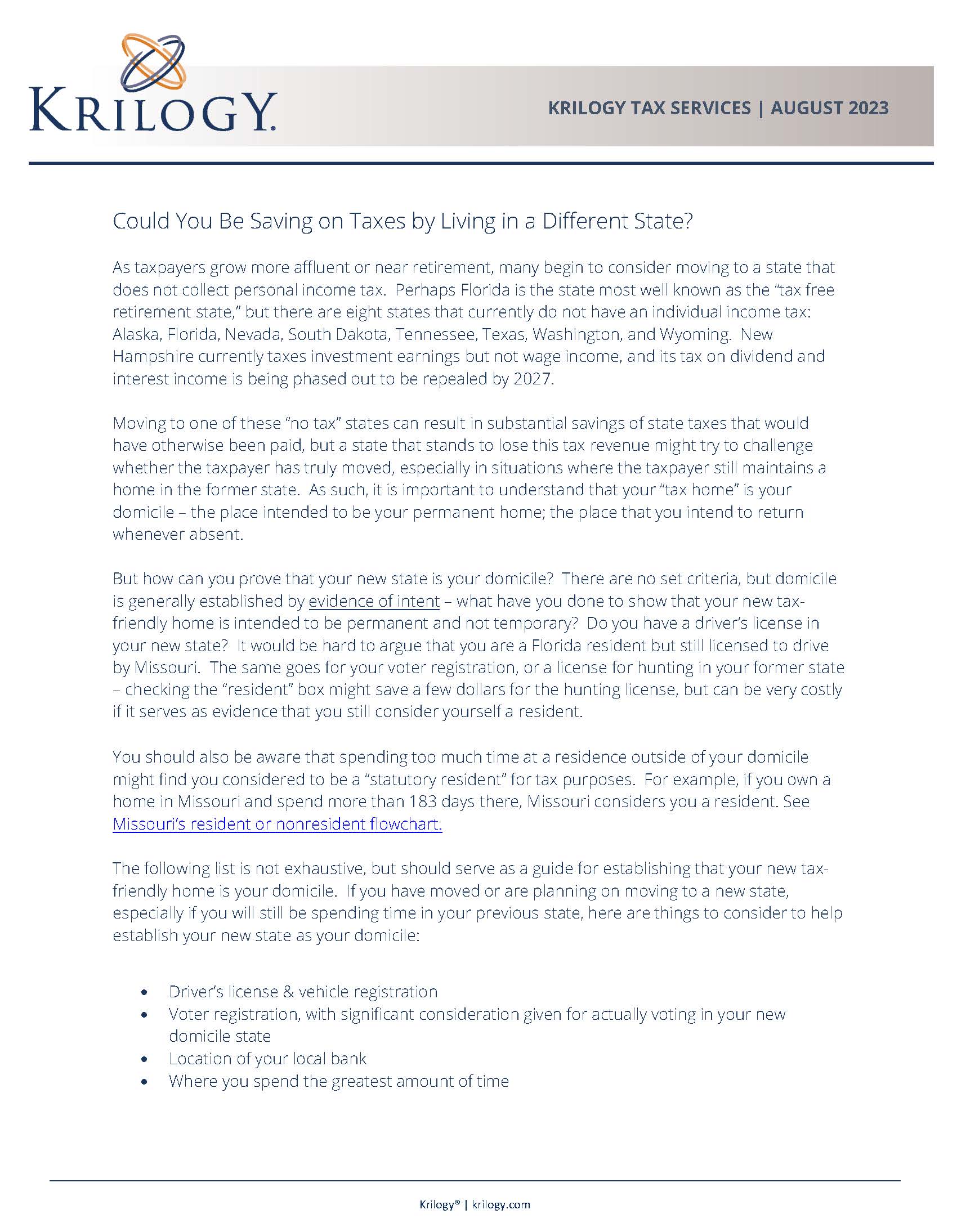Could You Be Saving on Taxes by Living in a Different State?
As taxpayers grow more affluent or near retirement, many begin to consider moving to a state that does not collect personal income tax. Perhaps Florida is the state most well known as the “tax free retirement state,” but there are eight states that currently do not have an individual income tax: Alaska, Florida, Nevada, South Dakota, Tennessee, Texas, Washington, and Wyoming. New Hampshire currently taxes investment earnings but not wage income, and its tax on dividend and interest income is being phased out to be repealed by 2027.
Moving to one of these “no tax” states can result in substantial savings of state taxes that would have otherwise been paid, but a state that stands to lose this tax revenue might try to challenge whether the taxpayer has truly moved, especially in situations where the taxpayer still maintains a home in the former state. As such, it is important to understand that your “tax home” is your domicile – the place intended to be your permanent home; the place that you intend to return whenever absent.
But how can you prove that your new state is your domicile? There are no set criteria, but domicile is generally established by evidence of intent – what have you done to show that your new tax-friendly home is intended to be permanent and not temporary? Do you have a driver’s license in your new state? It would be hard to argue that you are a Florida resident but still licensed to drive by Missouri. The same goes for your voter registration, or a license for hunting in your former state – checking the “resident” box might save a few dollars for the hunting license, but can be very costly if it serves as evidence that you still consider yourself a resident.
You should also be aware that spending too much time at a residence outside of your domicile might find you considered to be a “statutory resident” for tax purposes. For example, if you own a home in Missouri and spend more than 183 days there, Missouri considers you a resident. See Missouri’s resident or nonresident flowchart.
The following list is not exhaustive, but should serve as a guide for establishing that your new tax-friendly home is your domicile. If you have moved or are planning on moving to a new state, especially if you will still be spending time in your previous state, here are things to consider to help establish your new state as your domicile:
- Driver’s license & vehicle registration
- Voter registration, with significant consideration given for actually voting in your new domicile state
- Location of your local bank
- Where you spend the greatest amount of time
- Homestead exemption – this might be the strongest piece of evidence you can have. For example, to obtain a homestead exemption in Florida, a taxpayer must separately apply for the exemption, and provide documentation that the residence is the “permanent home and principal establishment.” Once granted, it is very conclusive evidence of domicile
- Gatherings for family and social events: Country clubs, fraternal organizations, athletic organizations, birthday parties
- Also reflected in social media – be sure to post more when in the favorable tax state, and be careful of the wording of your posts! It may seem trivial, but announcing that you are “back home” in your former state might be used to argue you are still a resident there.
- Where you employ professionals – doctors, lawyers, CPAs, dentist, vets, etc.
- What state you are listed in the phone book (if at all)
- Where pets live
- Cemetery plot location
- Church location
- Safe deposit boxes
- Which state you were born in can reinforce the fact pattern
- For example, if you were born in Texas and trying to claim Texas residence this would be a stronger claim to establishing domicile in Texas.
- Where personal or valuable items are kept: art, family heirlooms, pictures, furniture
- Address used for: insurance, mortgages, deeds, leases, passports, or tax returns
- State in which you are employed or conduct business
- State in which unemployment compensation is received
- State in which professional licenses or union memberships are maintained
- Which state is property owned and maintained for year-round living
- Which residence has tv or internet connections
- Where you receive mail
- State used for hunting and/or fishing licenses – as mentioned above, this can be a trap if the taxpayer claims the residence of the unfavorable tax state
- Address on letterhead or checks
- If possible, sever ties to old domicile – return old driver’s license, cancel old voter registration, closing old local bank and gym membership accounts
- Anything sent to government should be postmarked from the favorable tax state
When considering moving to a more favorable tax state, taxpayers need to be aware that their actions will help to establish their domicile, especially if they will be splitting time between states. As mentioned above, this is not an all-inclusive list, but if you are moving, the more of these items that can be updated to reflect your new state, the stronger your claim of a new domicile will be. Expert guidance by trusted professionals who have helped families through similar moves is valuable; please feel free to reach out to your Krilogy® team with any questions you may have.
Krilogy® does not provide tax and legal advice. Krilogy® is affiliated with Krilogy Tax Services, LLC. Krilogy® Tax Services provides tax planning and preparation services for an additional cost to Krilogy® clients. You should consult your attorney or qualified tax advisor regarding your situation.




















